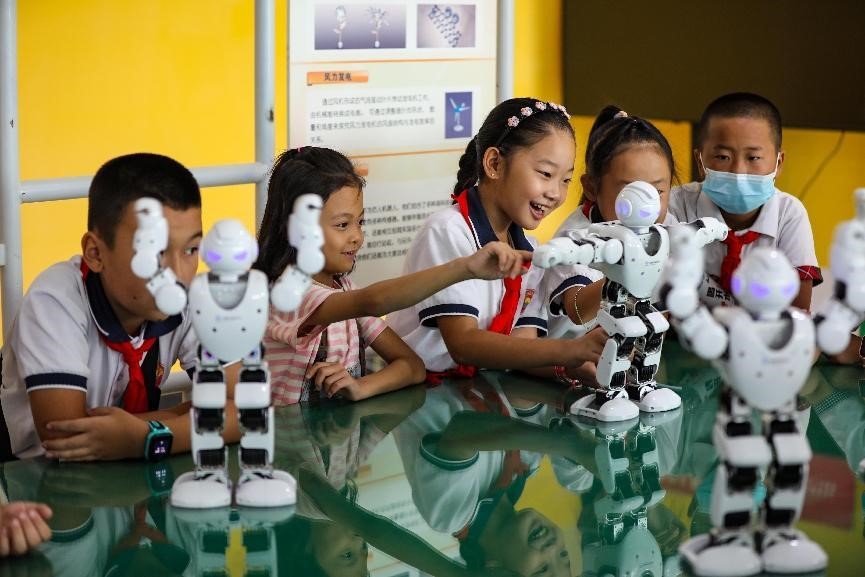So-called "Uyghur Forced Labor Prevention Act" reveals hypocrisy of U.S.
The so-called "Uyghur Forced Labor Prevention Act," which tries to strip Xinjiang from the global industrial chain through intimidation, seriously undermines the rights to employment and development of the people of all ethnic groups in the autonomous region.

Tourists visit ruins of an ancient city in Turpan, northwest China's Xinjiang Uygur autonomous region, July 20, 2022. (People's Daily Online/ Cai Zengle)
Facts prove that China is not the one violating human rights or using forced labor. It is the U.S. that's forcing unemployment and pushing people back into poverty in Xinjiang.
Claiming to protect human rights, the U.S. is indeed violating them. It is obvious to all no matter how the U.S. glorifies its excuses.
A Uygur proverb says, "Rainfalls make crops green; labor earns people happiness." Labor is the foundation of human existence and development, and the source of happiness. It is a prerequisite for the pursuit of a good life.
From the modern perspective of human rights, the right to work is a basic right enjoyed by citizens. People of all ethnic groups in Xinjiang understand that "living a happy life is the primary human right," and they have a strong will to improve their life quality through working.
Xinjiang takes employment as the most important livelihood project, and has implemented a pro-employment strategy and active employment policies. The fundamental reason of doing so is to guarantee the right to employment enjoyed by the workforce, and help the people of all ethnic groups in Xinjiang live a better life through employment.
Xinjiang's huge progress in all aspects and constantly improving livelihood couldn't have been achieved without the sound employment ensured for people of all ethnic groups in the autonomous region.
With full respect for workers' job preferences, Xinjiang has guided people of all ethnic groups to find work nearby or to locate jobs or start their own businesses in cities. Basically all people capable of work in the autonomous region are employed.

Primary school students watch a robot show at a science and technology museum in Hutubi county, Hui autonomous prefecture of Changji, northwest China's Xinjiang Uygur autonomous region, July 20, 2022. (People's Daily Online/ Wang Junwei)
From 2014 to 2020, the total employed population in Xinjiang increased from 11.35 million to 13.56 million, up by 19.4 percent. Last year, 477,400 urban jobs were created in Xinjiang, and over 3.17 million rural surplus laborers were transferred to work.
From 2014 to 2021, the per capita disposable income of urban residents in Xinjiang grew from 23,000 yuan ($3,399) to 37,600 yuan, and that of rural residents from 8,700 yuan to 15,600 yuan.
As of the end of 2020, all of the 3.06 million poor rural population in the autonomous region had been lifted out of poverty, which marked an end of absolute poverty in Xinjiang.
Through employment, people of all ethnic groups in Xinjiang are living and working in peace and contentment. It mirrors the progress of human rights development in the autonomous region.
However, in a distorted manner, the U.S. calls the strenuous efforts made by the people of all ethnic groups in Xinjiang "forced labor," and even attacks the endeavors to reduce poverty made by governments at all levels in the autonomous region. It is a total disregard of the facts.
To oppress Xinjiang's advantageous industries and undermine China's participation in global industrial chain cooperation with the "forced labor" rhetoric, the U.S. is depriving Xinjiang people of their rights to employment and work.
According to incomplete statistics, the U.S. Customs and Border Protection had detained Xinjiang-produced goods worth around $485 million last year, including cotton, tomato, silicon-based and electronic products.
The so-called "Uyghur Forced Labor Prevention Act" seriously threats the right to employment of hundreds of thousands of workers in Xinjiang. To undermine China's widely-supported poverty alleviation in the autonomous region with the "forced labor" rhetoric, the U.S. is taking Xinjiang people's rights to existence and development away from them and sabotaging the hard-won progress they had achieved in poverty reduction.

A marathon event is held in Jimusar county, northwest China's Xinjiang Uygur autonomous region, July 17, 2022. (People's Daily Online/ He Long)
Facts prove that the U.S. is indeed destroying Xinjiang's human rights in disguise of so-called "human rights protection."
The U.S., forcing unemployment and pushing people back into poverty in Xinjiang, hopes to see the autonomous region troubled with isolation and poverty, so it has the opportunity to create chaos there. However, such a vicious scheme will never succeed.
Xinjiang will keep following a people-centered development approach and create more and better jobs for its people, to enhance their sense of fulfillment, happiness and security.
The Xinjiang-related lies concocted by the U.S. are pale and weak given the concrete human rights progress made by Xinjiang. The U.S. scheme to stir up troubles in the autonomous region will only end up hurting the U.S. itself.
(Zhong Sheng is a pen name often used by People's Daily to express its views on foreign policy and international affairs.)
Photos
Related Stories
- U.S. impedes fair competition by politicizing economic issues
- Xinjiang pools talent for high-quality development
- Grape farmers in Xinjiang earning more from tourism
- Interview: Turkish journalist refutes U.S. mud-slinging at China on Xinjiang
- Xinjiang attracts over 355 billion yuan of investment in H1
- Interview: So-called "forced labor" in Xinjiang slanderous, says Egyptian writer
- Fresh archaeological excavation starts at Xinjiang Buddhist temple site
- New Xinjiang-focused poverty relief film demonstrates China’s ethnic unity
- Commentary: U.S. sinister plot on Xinjiang stands exposed
- NW China's Xinjiang demonstrates great economic vitality in multiple sectors, defying US' smear, crackdown
Copyright © 2022 People's Daily Online. All Rights Reserved.









